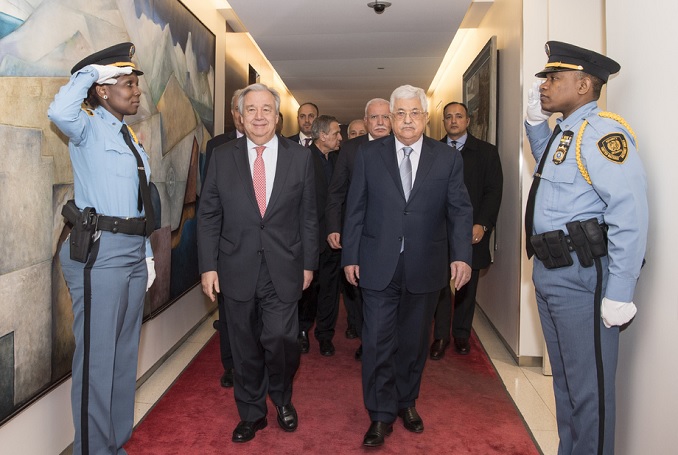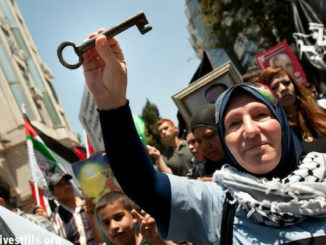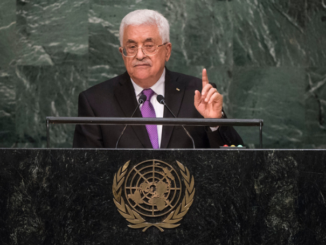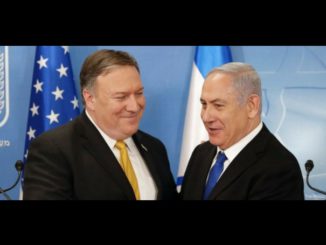
By Rima Najjar
As a Palestinian, I am skeptical about Mahmoud Abbas’s address, billed by the press as “Abbas delivers rare address at UNSC meeting”, which calls for two states.
Whereas I believe that the Boycott, Divestment and Sanctions (BDS) movement’s goals can be achieved through more than one political accommodation, including a two-state scenario in historic Palestine as a solution to its violent partition in 1948, I am skeptical about the ability or will of the international order to achieve this end without compromising Palestinian fundamental human rights.
Read my answer to ‘Why is it so difficult to reform the United Nations Security Council?’ here.
Abbas is addressing a world order impotent to stand up to Israel – one that is also committed to Israel’s Jewish national identity and to advancing its national security. They are the very same players who have, without question, deceived the Palestinian people throughout the long decades of Oslo.
As the ESCWA report on Israel’s Apartheid noted in the introduction,
“the policies, practices and measures applied by Israel to enforce a system of racial discrimination threaten regional peace and security. United Nation resolutions have long recognized that danger and called for resolution of conflict so as to restore and maintain peace and stability in the region.”
Recognition has yet to translate into action as far as the U.N. is concerned.
Additionally, instead of unifying all segments of the Palestinian people (who are fragmented as a condition imposed by Israel) behind the goal of liberation, Abbas is cooperating with Israel and its allies in the escalation of the deprivation of the Palestinian people in the Gaza Strip – in order to pressure them into relinquishing their political objectives.
Such political maneuvering on Abbas’s part has turned the goal of the Palestinian people, as Karma Nabulsi expressed it, on its head:
“The goal of Palestinians is to unify for the struggle to liberate their land and return to it, and to restore their inalienable human rights taken by force – principles enshrined in centuries of international treaties, charters, and resolutions, and in natural justice.”
The creation of a Jewish state in Palestine dispossessed Palestinian Arabs, against their will, of land and property, as well as of their fundamental right to self-determination in their own homeland in favor of self-determination for Jews worldwide.
In my opinion, without addressing Israel’s legitimacy as a Jewish state in Palestine, the Palestinian people are unlikely ever to achieve self-determination in their own homeland. The right of the Jewish people to self-determination in a state of their own is a right acknowledged internationally today, but one that must be challenged, if only from a demographic perspective in Palestine.
As Albert T. Clay wrote in the February 1921 issue of The Atlantic:
“A visit to some of the better established Jewish colonies will not fail to awaken sympathy for Economic Zionism. No unbiased observer of past events could think of throwing obstacles in the way of those Jews who, being persecuted in certain lands, prefer to live in a community solely Jewish; or who, through historical sentiment, long to reside in a purely Jewish cultural community in the land of their ancestors. Only an extremist would deny the gratification of their desires to as many of these people as can be accommodated; yet it must be borne in mind that, as estimated by experts, the tiny country can support only about a million and a half additional inhabitants; which number, if all were Jews, would represent only one tenth of the fifteen millions in the world.”
The Palestinians have never held the bargaining chips in their tragedy and might as well go for broke – ending the Apartheid Zionist colonial regime in all of historic Palestine. We have spent enough time agreeing to piecemeal “solutions” during the so-called peace process that achieved nothing but unspeakable inhumanity and suffering.
– Rima Najjar is a Palestinian whose father’s side of the family comes from the forcibly depopulated village of Lifta on the western outskirts of Jerusalem. She is an activist, researcher and retired professor of English literature, Al-Quds University, occupied West Bank. She contributed this article to PalestineChronicle.com.








